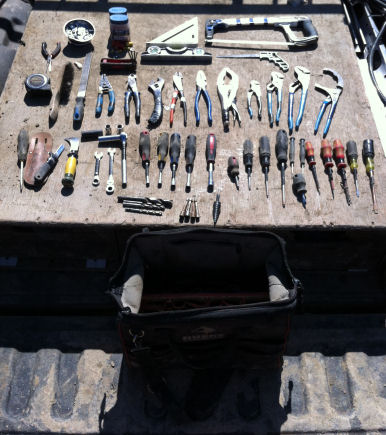Electrician Hand Tools Buyer's Guide
Your budget for buying electrician hand tools is probably quite limited when you are just starting your career as an electrician’s apprentice. Even so, tools are one area where it does not pay to cut costs.

But if you have a bad habit of losing things, you may not want to buy top of the line.
Cheap electrician hand tools will wear out more quickly and are often much more difficult to use. You will quickly learn that something as simple as the comfortable rubber handle of a screwdriver will make a huge difference by the end of the day.
Your Tool Belt
The first item you may want to consider is an electrician tool pouch. There are many styles of belts available, aimed at specific trades.
For example, capenter’s tools differ from an electrician’s, therefore a belt designed for a carpenter won’t have the same pockets and pouches. You need to be able to arrange your tools in a way that makes them easy to grab in a hurry.
The belt itself has some weight – usually about 7 pounds. As you add tools, this weight increases. Carrying this weight all day can really wear you out.
That is why more professionals are opting for tool vests. The weight of the vest and electrician hand tools is evenly distributed over your torso, putting less pressure on your back.
An electrician tool pouch holds all your tools in a handy, ready-to-use state. It is free-standing for easy access.
Safety and Convenience
Whether you choose a vest, pouch or a belt, you will need something with several pockets and holders. The holders, or loops are a convenient place for pliers, hammers and wrenches. The sheath is designed for screwdrivers and utility knives.
The best part about a vest is that you can add or remove extra pockets and loops. If you know you will only need a few screwdrivers, pliers and wire cutters, removing all of the other tools from your belt can be bothersome and time-consuming.
With a vest, you just un-clip the the loops and pockets holding the extra tools and you are good to go.
Care for Your Electrician Hand Tools
Since electrician hand tools are so expensive, you would be wise to take good care of them. If there is any chance at all that someone may snatch your tools when you aren’t looking, lock them up.
As a first year apprentice, the cost of a high-quality, locking tool box might seem extravagant, but it will save you a lot of money in the long run. It is much cheaper than replacing your tools every week.
Basic Electrician Hand Tools
Your tool bag won’t be complete without these simple, yet essential, electrician hand tools:
Pliers – Number One Electrician Tool
Pliers come in a vast array of styles and sizes. A well equipped electrician's tool set will contain several varieties.
- Lineman’s Pliers – You will often come across situations where lineman pliers are needed, but this is one type you can put off for a while as your trainer will have a good set. Highly recommended for an industrial electrician.
- Needle Nose Pliers – You will find these indispensable. It is a good idea to have a few in different sizes, or buy a set. A set will include pliers with built-in wire cutters and strippers. Tip: Get ones with a rough plier grip so it won’t slip when grabbing a small smooth object.
- Crimping Pliers – Used to install butt splices and Sta-kons. Be certain to get a pair that has the insulated and-non insulated option.
Cutters
- Side Cutters – These types of cutters come in very handy for cutting wire, as well as nails or staples that may be in the way. Make sure to get a pair, or set, specifically designed for electricians.
- Cable Cutters – More powerful than regular cutters, used to cut larger conductors or smaller cable. Make sure to only cut ideal material, or the cutters will wear out too fast.
- Wire Strippers – Used to strip the insulation from the wire without damaging the wire. Make sure to choose the right cutter size for conductor to be stripped.
Screwdrivers and Tighteners
Since terminating wires and installing conduits will be a big part of your job, screwdrivers are essential. Again, you will need a good variety.
- Variable Screwdriver – You will need at least one of each type, but several different sizes is recommended. A good set will include different sizes of flat heads, Phillips and Robertson (square heads) screwdrivers.
- Nut Drivers – These look similar to a screwdriver, but the hollow shaft and special tips are specifically designed for nuts, rather than screws. A good set includes sizes from 1/4″ to 7/16″. 9/16″ is usually sold separately, but a good nut driver to have.
- Hex Keys Metric – These are ideal in a flip away set. Individual keys are too easy to lose. The set comes in various sizes ranging from about 5 keys to 16.
- Socket Set – Socket drivers are similar to nut drivers, as they do the same job. When you have a lot of nuts to tighten, a socket wrench is ideal because it is quicker than a nut driver. You don’t want to carry an entire socket set in your tool belt, though. Just carry the wrench and the most common sizes of socket heads and you should be fine. (Tip: Personally, I find 1/4″, 1/2″, 7/16″ and 9/16″ to be most common as an industrial electrician.)
- Adjustable/Crescent Wrench – You will need one of these quite often, but usually only for light work. Buy the best you can afford. I find that the cheaper models break and bind up easily.
- Pipe wrench – You will find many situations where a pipe wrench is invaluable. Often a set of Channellocks is all that is required for a apprentice electrician to carry.
Some Other Essential Electrician Hand tools:
- Hack Saw – Used to cut strut, conduit and cable.
- Skinning Knife – Used to strip cable and insulation
- Tape Measure – Used for measuring strut, conduit and tray and many other things. A 25-foot tape measure should be sufficient for any task.
- Torpedo Level – Magnetized for convenience and accurate readings.
- Vise Grips – Coms in handy as an extra support, especially when working alone.
- Conduit reamer – If your job involves running a lot of conduit, you will definitely need one of these.
Meters and Testers
Working with electricity means you have to know where the current is flowing and if the repairs you made fixed the problem.
- Multimeter – You need a multimeter capable of reading up to 600 volts, and able to detect continuity. Preferably, you should have the clamp-on style with amperage capabilities.
- Tick tester – This is a non-contact voltage detector. A handy pocket model runs on AAA batteries.
- Plug tester – You would use this to test newly installed or malfunctioning plugs. One with a built in GFI tester is ideal and not too costly.
- Volt tester – These simple testers test the presence of specific voltages and continuity. You can use this instead of a multimeter, but most electricians will have both.
Drill Set

You will need a good power drill. A cordless drill is ideal. Drills with a saw attachment have become very popular, but a regular hack saw will work just as well.
Drill sets can include a large assortment of drill bits. Carrying all of this in your tool belt will be quite a hassle, so just take the bits you use most often and leave the rest in your tool box.
Most cordless drills come with two rechargeable batteries, although having a third battery can come in handy.
This drill and impact combo is the exact kit I used from 2nd year to journeyman.
With these tools, you will have a well-equipped tool belt. As you progress in your career you may require additional electrician hand tools, but with this list you will be well on your way.





